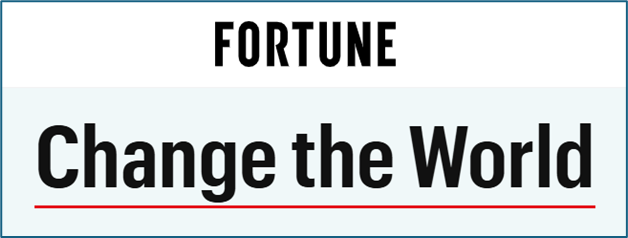Fortune Award Puts Spotlight on Stakeholder Capitalism Leaders
Click here to subscribe to the ESM weekly e-newsletter.
Fortune magazine’s Change the World list, now in its 11th year, recognizes companies that are having a positive social impact as part of their core
 business strategy.
business strategy. According to the editors, “In times of economic anxiety, the idea of a company choosing to make business decisions based on a sense of social responsibility can seem quaint, or even softheaded. Facing a wildly volatile trade climate, fears of inflation, and the unpredictable and unstoppable AI revolution, many companies have reverted to a back-to-basics mindset—focusing on the bottom line and putting stakeholder capitalism on the back burner.
“But this calculus is different for companies that have baked social problem-solving into their business models. Their leaders recognize that there’s profit to be made from having a positive impact on people and the planet—whether directly, through sales of their products and services, or indirectly, as their actions build a stronger talent pool, attract more customers, and strengthen the economic resiliency of their communities. And in uncertain times, that value proposition only gets stronger.”
Primary factors for selection in the list considered include:
- Measurable social impact: The reach, nature, and durability of the company’s impact on one or more specific societal problems.
- Business results: The benefit the socially impactful work brings to the company. In the editors’ calculations, profitability and contribution to shareholder value outweigh benefits to the company’s reputation.
- Degree of innovation: The magazine’s editors consider how innovative the company’s effort is relative to that of others in its industry and whether other companies have followed its example or partnered with it.
Although the editors’ methodology does not appear to have included the evaluation of the financial returns of the companies, a five-year ChatGPT analysis that was not independently verified finds that the stock performance of the 25 public companies on the list did about as well as the S&P 500 over three years and exceeded it over five years. Demonstrating the drawbacks of such an analysis, note that the win depends heavily on a few outsized performers, including Cloudfare, Santander, JCI and Costco. On the other hand, Alibaba (and to a lesser extent Baidu) pull the weight down.
Enterprise Engagement Alliance Services
 Celebrating our 15th year, the Enterprise Engagement Alliance helps organizations enhance performance through:
Celebrating our 15th year, the Enterprise Engagement Alliance helps organizations enhance performance through:1. Information and marketing opportunities on stakeholder management and total rewards:
- ESM Weekly on stakeholder management since 2009. Click here to subscribe; click here for media kit.
- RRN Weekly on total rewards since 1996. Click here to subscribe; click here for media kit.
- EEA YouTube channel on enterprise engagement, human capital, and total rewards since 2020
 Management Academy to enhance future equity value for your organization.
Management Academy to enhance future equity value for your organization.3. Books on implementation: Enterprise Engagement for CEOs and Enterprise Engagement: The Roadmap.
4. Advisory services and research: Strategic guidance, learning and certification on stakeholder management, measurement, metrics, and corporate sustainability reporting.
5. Permission-based targeted business development to identify and build relationships with the people most likely to buy.
Contact: Bruce Bolger at TheICEE.org; 914-591-7600, ext. 230.














